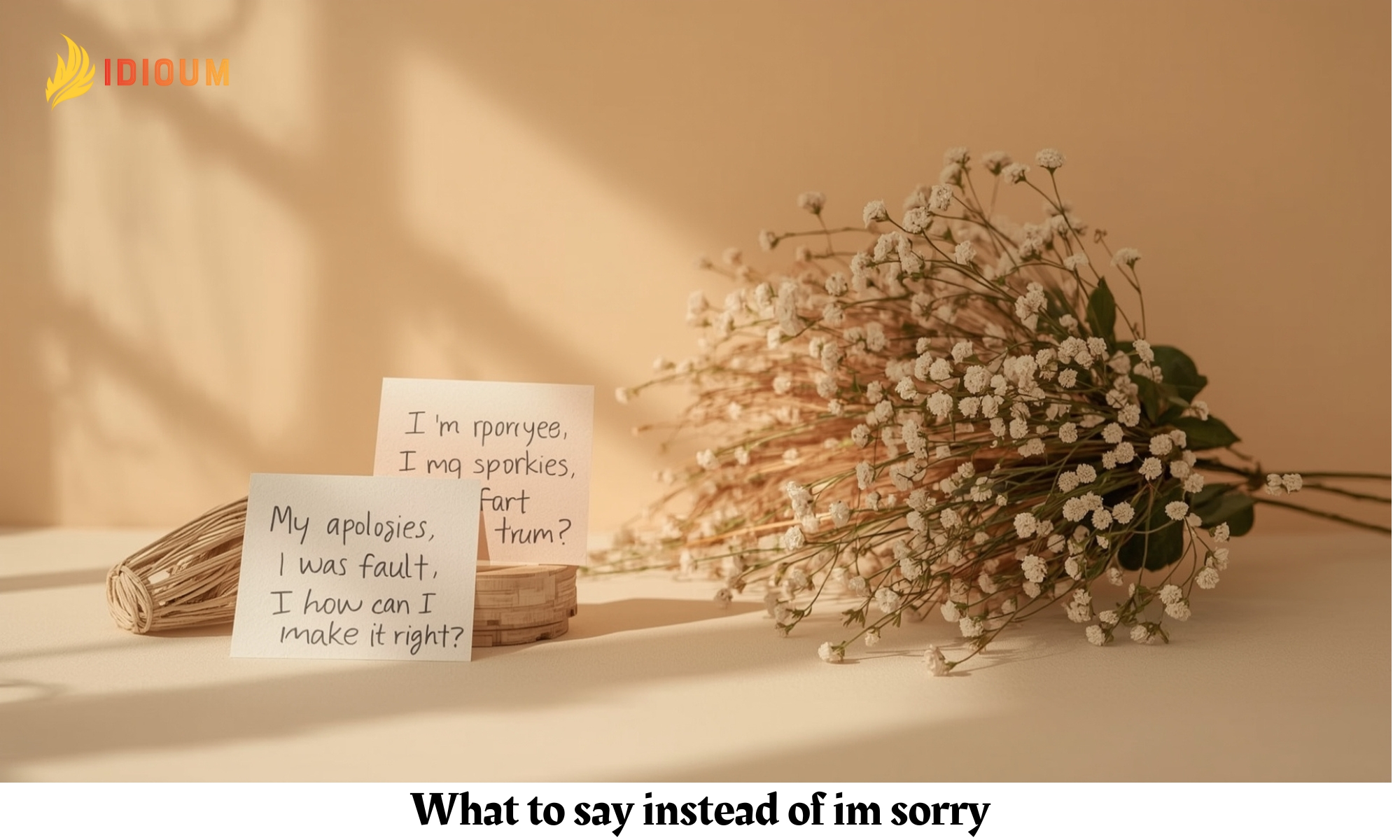We’ve all been there, something goes wrong, and the words “I’m sorry” tumble out before we even think.
But sometimes, saying “I’m sorry” just doesn’t feel right or enough. In some cases, it might even make things more awkward.
That’s why learning what to say instead of “I’m sorry” can be a game-changer for your relationships, your confidence, and your communication skills. 😊
Whether you’re trying to show empathy, own a mistake, or respond to someone’s pain, there are better ways to connect than defaulting to an apology.
In this post, we’ll explore simple, kind, and effective alternatives to “I’m sorry” that feel more genuine and supportive.
So if you’ve ever felt like “sorry” doesn’t say what you really mean, keep reading. These phrases will help you express yourself clearly without guilt or confusion.
Let’s dive into what to say instead of “I’m sorry,” and why it matters.
1. When You’ve Made a Mistake: Say “Thank You for Your Patience”
Mistakes happen. Instead of over-apologizing, flip the focus to gratitude. Saying “Thank you for your patience” shows maturity, accountability, and appreciation without shame.
🌟 Real-life example:
Let’s say you’re running 10 minutes late to a meeting. Instead of saying, “I’m sorry I’m late,” try:
👉 “Thanks so much for waiting for me.”
This shift keeps the tone positive while still acknowledging the delay. It shows you respect the other person’s time, and it doesn’t make the moment about your guilt.
❌ Don’t say: “I’m so sorry, I’m the worst for being late.”
✅ Do say: “Thanks for understanding I really appreciate it.”
2. When Someone’s Hurt: Say “That Sounds Really Hard”
We often rush to say “I’m sorry” when someone shares a painful story. But unless you caused the pain, there’s no need to apologize. Try showing empathy instead.
🌟 Real-life example:
A friend says, “I just lost my job.”
Instead of replying, “I’m so sorry,” try:
👉 “That sounds really hard. Do you want to talk about it?”
This response acknowledges their pain and invites connection. It also avoids making the moment about your feelings.
❌ Don’t say: “I’m sorry… I don’t even know what to say.”
✅ Do say: “I can only imagine how tough that is. I’m here for you.”
3. When You Interrupt or Bump Into Someone: Say “Excuse Me” or “Pardon Me”
Not every slip-up needs an apology. Small social missteps like interrupting someone or accidentally bumping into them can be smoothed over with courtesy, not guilt.
🌟 Real-life example:
You’re walking through a crowded hallway and accidentally brush past someone.
Instead of “Sorry!” try:
👉 “Excuse me.”
It’s polite and to the point without unnecessary self-blame.
❌ Don’t say: “Sorry for being in the way all the time.”
✅ Do say: “Pardon me thanks for making room.”
4. When You Need Help: Say “Could You Help Me With This?”
Many people say “sorry” when asking for help, as if needing assistance is a burden. It’s not.
Asking clearly and respectfully is more effective and more confident.
🌟 Real-life example:
You need a coworker’s help on a tricky project. Instead of “Sorry to bother you,” try:
👉 “Could I get your input on this? I’d really value your opinion.”
This shows you trust their expertise and don’t feel guilty for needing support.
❌ Don’t say: “Sorry for asking you again.”
✅ Do say: “Thanks for helping me out I really appreciate it.”
5. When You Need to Set a Boundary: Say “I Can’t Right Now, But…”
Saying no doesn’t require an apology. Instead of “I’m sorry, I can’t,” try being clear and respectful with your boundaries.
🌟 Real-life example:
Someone asks you to take on another task at work, but you’re overwhelmed. Try:
👉 “I can’t take that on right now, but I can check in tomorrow if that helps.”
This shows you care, but also value your time and capacity.
❌ Don’t say: “I’m sorry, I just can’t handle anything right now.”
✅ Do say: “I need to pass on this today, but I’ll follow up soon.”
6. When You’re Expressing Emotion: Say “Thank You for Listening”
If you’re venting, crying, or opening up, you might feel tempted to say, “I’m sorry for being emotional.” Don’t! Your feelings are valid.
🌟 Real-life example:
You get teary while talking about something personal. Instead of apologizing, try:
👉 “Thanks for being here for me it means a lot.”
This reinforces the connection and reminds both of you that emotions are human not something to feel guilty about.
❌ Don’t say: “I’m sorry for crying.”
✅ Do say: “I appreciate your support while I get this out.”
Final Thoughts
Learning what to say instead of “I’m sorry” can help you build stronger, healthier relationships.
It’s not about avoiding accountability, it’s about communicating with more confidence, kindness, and clarity.
Whether you’re expressing gratitude, setting a boundary, or showing empathy, these phrases help shift the focus from guilt to growth.
So next time “sorry” is on the tip of your tongue, pause and try one of these supportive alternatives instead.












